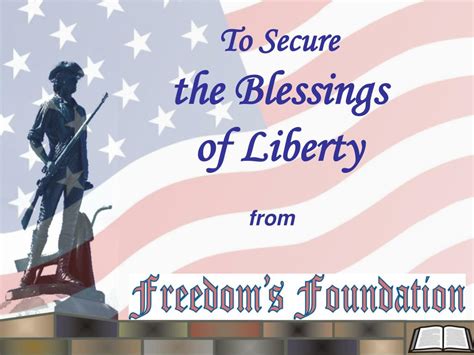To Secure The Blessings Of Liberty

To secure the blessings of liberty, it is essential to understand the fundamental principles that underpin this concept. Liberty, in its most basic form, refers to the freedom of individuals to make choices and live their lives as they see fit, without undue interference from external forces, such as governments or institutions. This idea has been a cornerstone of political and philosophical discourse for centuries, with various interpretations and implementations across different cultures and historical periods.
Historical Context of Liberty

The concept of liberty has evolved significantly over time, influenced by numerous historical events, philosophical writings, and social movements. In ancient Greece, for example, liberty was closely tied to the concept of “eleutheria,” which referred to the freedom of citizens to participate in the political process. Similarly, in ancient Rome, “libertas” was a central value, emphasizing the importance of individual freedom and the rule of law. The modern concept of liberty, however, is often attributed to the Enlightenment thinkers of the 17th and 18th centuries, such as John Locke, who argued that individuals have inherent rights to life, liberty, and property.
One of the key challenges in securing the blessings of liberty is balancing individual freedom with the need for social order and collective well-being. This tension is reflected in the works of philosophers like Jean-Jacques Rousseau, who posited that individuals enter into a social contract to ensure their mutual protection and benefit, thereby sacrificing some of their natural liberties in exchange for the benefits of societal living. This trade-off between individual liberty and collective security remains a central dilemma in political philosophy and practice.
Elements of Liberty
Liberty encompasses several key elements, including freedom of speech, freedom of assembly, freedom of religion, and the right to due process under the law. These elements are fundamental to the concept of liberty because they enable individuals to express their thoughts, associate with others, practice their beliefs, and be protected from arbitrary detention or punishment. The protection of these liberties is typically enshrined in a country’s constitution or bill of rights, serving as a safeguard against government overreach and ensuring that power is distributed in a way that respects individual autonomy.| Element of Liberty | Description |
|---|---|
| Freedom of Speech | The right to express opinions and ideas without fear of censorship or retribution. |
| Freedom of Assembly | The right to gather and associate with others for political, social, or cultural purposes. |
| Freedom of Religion | The right to practice one's religious beliefs, or lack thereof, without persecution or discrimination. |
| Right to Due Process | The right to fair treatment under the law, including the right to a fair trial and protection against arbitrary arrest and detention. |

Challenges to Liberty

Despite its importance, liberty faces numerous challenges in the modern world. These challenges can come from various sources, including governments, corporations, and even individuals themselves. For instance, the rise of surveillance states and the collection of personal data by corporations pose significant threats to individual privacy and autonomy. Moreover, the erosion of civil liberties in the name of national security or public safety can undermine the very foundations of liberty.
Another critical challenge is the economic inequality that can limit access to education, healthcare, and other resources necessary for the full exercise of liberty. When individuals are denied these basic necessities, their ability to make choices and live their lives as they see fit is severely curtailed. Thus, securing the blessings of liberty also requires addressing issues of economic justice and ensuring that all individuals have the opportunity to thrive.
Strategies for Securing Liberty
Given the complexities and challenges associated with liberty, securing its blessings requires a multifaceted approach. This includes strengthening democratic institutions, promoting civic education, supporting independent media, and fostering a culture of critical thinking and tolerance. Additionally, it is crucial to establish and maintain robust legal frameworks that protect individual rights and ensure accountability for those in power.Key Points
- Liberty is a fundamental concept that encompasses freedom of speech, assembly, religion, and due process.
- The historical development of liberty is marked by significant philosophical and political milestones.
- Challenges to liberty include government overreach, economic inequality, and the erosion of civil liberties.
- Securing liberty requires a multifaceted approach that includes strengthening democratic institutions and promoting civic education.
- A culture that values freedom, tolerance, and the rule of law is essential for the protection and advancement of liberty.
In conclusion, securing the blessings of liberty is a complex and ongoing task that requires the efforts of individuals, communities, and societies as a whole. By understanding the historical context, philosophical underpinnings, and practical challenges of liberty, we can work towards creating a world where individual freedom and dignity are respected and protected. This endeavor is not only a moral imperative but also a necessary condition for the flourishing of human potential and the advancement of human well-being.
What is the significance of liberty in modern society?
+Liberty is essential for the protection of individual rights, the promotion of creativity and innovation, and the fostering of a culture that values freedom and autonomy.
How can economic inequality impact liberty?
+Economic inequality can limit access to education, healthcare, and other resources, thereby restricting an individual’s ability to make choices and live their life as they see fit.
What role does education play in securing liberty?
+Education is crucial for securing liberty as it empowers individuals with the knowledge and critical thinking skills necessary to make informed decisions and participate fully in the democratic process.



